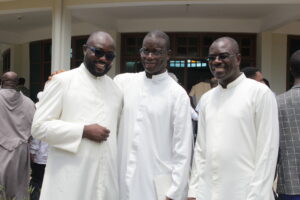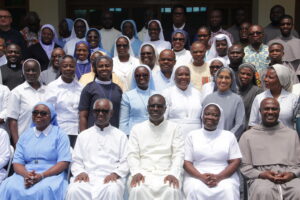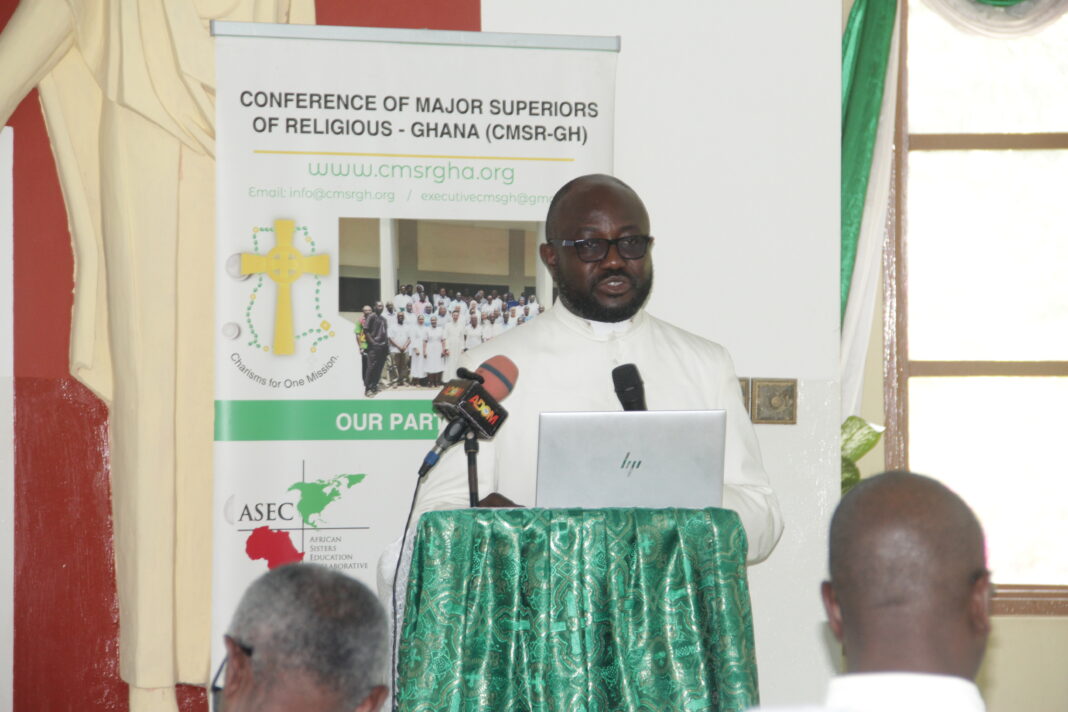Rev. Fr. Michael Quaicoe, Director of Governance, Justice and Peace at the National catholic Secretariat in Accra says that the Conference of Major Superiors of Religious, Ghana (CMSR-GH) and the Ghana Catholic Bishops’ Conference (GCBC) must unite to lead the charge for a corruption-free society.
“We must become moral beacons, demonstrating that ethical leadership is possible and necessary,” he said this in a talk at the Holy Cross Continuing Formation Centre, Brafoyaw-Cape Coast on Wednesday, October 9, 2024 during the Biannual Meeting of the CMSR-GH.
The Meeting was attended by about 70 Major Superiors of the various Congregations in Ghana.
According to him, through joint initiatives, the CSMR-G and the GCBC could implement anti-corruption education in our schools, parishes, and communities, emphasizing the moral and social dangers of corruption.”
Speaking on “Working together for a sustainable, peaceful, and corruption-free Ghana: the role of collaboration between the Conference of Major Superiors of Religious and the Ghana Catholic Bishop’ Conference,” he said the GCBC’s advocacy efforts can also influence national policy on governance, while the CMSR-GH can support grassroots activism that holds leaders accountable and educates citizens on their role in fighting corruption.

“Corruption is a major obstacle to Ghana’s development, he intimated, saying that the absence of the necessary levels of moral integrity in our social fabric and interactions is a debilitating deficit. It undermines trust in institutions, deepens poverty, and creates inequality, he noted.
“As Church leaders, we must raise our voices against corruption and lead by example, promoting transparency, integrity, and accountability. Charity, they say, begins at home,” he said, emphasising that “We must indeed be trustworthy, giving to all who deal with us, no reason to doubt our motives.”
This implies the mature blend of justice and mercy, he added.
He declared: “Beyond spiritual leadership, the Church has a significant role in the social, economic, and political development of Ghana,” Fr. Quaicoe noted, stating, “Our institutions—schools, hospitals, and charities—serve millions, and we are called to shape the future of our country through values-based leadership.”
He added: “Our combined efforts in promoting sustainable development must include education, advocacy, and direct involvement in eco-friendly projects.”
He indicated that the CMSG, through its religious communities, can partner the GCBC to promote sustainable agriculture, water conservation, and environmental stewardship programmes in local communities.
“The GCBC, with its broad national influence, should consider CMSG in its advocacy strategies and efforts for policies that ensure environmental protection at the governmental level – local and national,” he averred.
This partnership, according to Fr. Quaicoe “allows us to utilize our diverse strengths to influence both grassroots action and national policy, ensuring a holistic approach to sustainability.”
In his view, the CMSR-GH and GCBC can work hand in hand to also promote peace by strengthening conflict resolution and peace-building initiatives across the country.
“The CMSG, with its diverse religious orders, can foster peace through community-level projects and spiritual direction, while the GCBC can use its platform to encourage dialogue among political leaders, civil society, and traditional authorities,” he stated.
He pointed out that “the Church’s moral authority places us in a unique position to mediate conflicts and promote peace in our communities and nation,” saying, “Together, we can lead peace campaigns, workshops, and outreach programmes that reinforce the importance of unity in diversity.”

According to the Director of Governance Justice and Peace at the NCS, by working together, the CMSR-GH and GCBC can engage in impactful projects that target poverty alleviation, youth empowerment, and healthcare.
“Both conferences have the resources, networks, and influence to foster large-scale social development programs. This collaboration ensures that the Church remains a positive force for development across all sectors of society,” he stated.
By Newswtachgh.com



